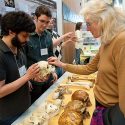World Stem Cell Summit comes to Madison Sept. 21-23
Meeting stem cell experts from around the world, unique networking opportunities, and a public day of outreach await those attending the World Stem Cell Summit and related events Sept. 21-23 in Madison, Wis.
This is not your typical scientific meeting. The entire summit is open to anyone. In the past, the event has brought together a vast network of not only scientists and clinicians, but also patients and patient advocacy groups, business leaders, entrepreneurs, students, teachers, journalists, bioethicists, politicians and the public.
“The World Stem Cell Summit, now in its fourth year, is intended to pull together people who are interested in all kinds of stem cell science to work together in charting the future of stem cell research and regenerative medicine,” says Bernard Siegel, executive director of the Genetics Policy Institute.
Co-hosting the summit at the Alliant Energy Center are the UW-Madison Stem Cell and Regenerative Medicine Center (SCRMC) and the WiCell Research Institute. More than 150 corporate sponsors and non-profit partners are also involved.
“We are excited to be putting on this meeting in Madison, Wisconsin, and through our university,” says Clive Svendsen, co-director of the SCRMC. “It is quite clear that Madison is a rapidly growing hub for both stem cell research and biotechnology, and that the university plays an enormous role in moving more of the science discoveries to the clinic.”
Planners expect that a hot summit topic will be the relatively new business of stem cell research-both investments in start-up companies with patented discoveries, and also how the established pharmaceutical industry is pursuing clinical applications in the field. Related discussions, both academic and economic, will focus on developing the research for drug testing, gene therapy, cell replacement, and tissue engineering. Patient-focused sessions will address stem cell advances and challenges as they relate to cardiology, diabetes, blindness, neurological disorders and other diseases.
Also prominent will be discussions on the ethics surrounding embryonic stem cells, and the realistic future of the “new” embryonic stem cells. These were the human skin cells reprogrammed by James Thomson of the University of Wisconsin–Madison and Shinya Yamanaka of Kyoto University to act just like the embryonic kind without the need to destroy the embryo.
Other summit topics, presented as keynotes, concurrent sessions and “lunches with the experts” will include international policies and progress, medical tourism, patients’ experiences and efforts to move the field forward, and challenges to clinical application.
Keynote speakers include Wisconsin Gov. Jim Doyle, stem cell luminaries James Thomson and Alta Charo from UW–Madison, and Peter Kiernan of the Christopher and Dana Reeve Foundation. Welcome remarks from Siegel and Svendsen, along with UW–Madison Chancellor Carolyn “Biddy” Martin, will open the summit.
The meeting will feature a poster competition, awards dinner, distribution of the 2008 Stem Cell Report, and a special summit opener — a free public day of science outreach at the Pyle Center on campus titled “Lab on the Lake.“
Lab on the Lake runs all day Sunday, Sept. 21. The day’s activities will include a Career and Education Fair, an experts panel, teachers workshops presented by the National Association of Biology Teachers and partners, guest speakers, hands-on stem cell lab outreach, and music by the Clyde Stubblefield Show on the Wisconsin Memorial Union Terrace. Lab on the Lake is co-sponsored by the Student Society for Stem Cell Research.
Lab on the Lake guest speakers include stem cell scientists Gabriela Cezar of UW–Madison and Rupa Shevde of WiCell/SCRMC. For the experts panel that Sunday afternoon, the students have lined up UW–Madison scientists James Thomson, Clive Svendsen and Tim Kamp, and bioethicist Linda Hogle. James Leonhart, executive director of the Wisconsin Biotechnology & Medical Device Association, rounds out the panel.
The World Stem Cell Summit, Lab on the Lake, and upcoming November events sponsored by the Wisconsin Academies of Sciences are also intended to recognize and celebrate the 10-year-anniversary of the first successful culture and isolation of human embryonic stem cells.
“The field has come a long way since James Thomson first broke the news of his discovery in the journal Science in 1998,” says Kamp, who co-directs the SCRMC along with Svendsen. “We’re proud to be celebrating his discovery, and the many advances made by him and others in this global field in the past decade.”
Interested UW–Madison faculty, staff, post-doctoral trainees and students should contact Sue Gilbert, (608) 265-8668, sggilber@wisc.edu, for information on special summit discounts.
Tags: biosciences, business, events, international, stem cells


